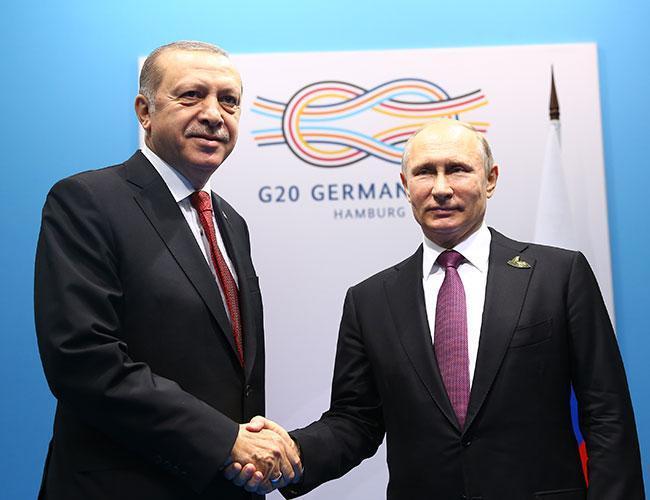
President Recep Tayyip Erdoğan and his Russian counterpart Vladimir Putin will meet on Nov. 13 in the Black Sea resort city of Sochi in Russia for their fifth meeting this year, with the Syrian crisis high on the agenda of talks.
The meeting in Sochi was agreed after a phone conversation between Putin and Erdoğan on Oct. 29, during which they discussed bilateral relations including cooperation on energy projects and efforts to find a political solution in Syria.
Their meeting comes amid accelerated efforts for a sustainable ceasefire in Syria among opposition groups and the Syrian regime through the establishment of de-escalation zones, with the latest one set up in the largely jihadist-controlled Idlib province where Turkish troops are deployed and have set up two checkpoints so far in order to monitor the truce.
The de-escalation zones across Syria, which are fruits of an agreement between guarantor states Russia, Turkey and Iran, also became one of the hot topics in the Turkey-Russia bilateral agenda increasing the number of demarche between the two capitals.
Many parts of Idlib, a bastion of Syrian opposition groups, are under the control of Hayat Tahrir al-Sham, a jihadist umbrella organization that includes former al-Nusra and al-Qaeda linked groups and is believed to have around 20,000 to 30,000 armed militants.
It is also a base for the Turkey-backed Free Syrian Army (FSA), Sunni armed opposition fighters, and Islamist armed group Ahrar al-Sham, which is in dialogue with Ankara, a reliable mediator for Moscow to convince these groups follow the rules of the de-escalation agreement.
Turkish security units in the region avoid any clashes with these groups and use its leverage on them for the separation between “moderates or radicals” as part of its efforts to consolidate a ceasefire.
The cooperation between Turkey and Russia over the Syrian crisis comes after Ankara couldn’t persuade the United States to stop cooperating with the People’s Protection Units (YPG).
Turkey views the Democratic Union Party (PYD), and its armed affiliate the YPG, as affiliates of the Kurdistan Workers’ Party (PKK), which is designated as a terrorist group by Ankara, the U.S., and the European Union.
Yet Russia’s military buildup in northern Afrin region to de-conflict clashes between YPG forces, operating from the northwestern Syrian province, and the Turkish-backed FSA is perceived as Moscow is enhancing its leverage on Syrian Kurds.
In a bid to hamper Syrian Kurdish ambitions to connect Afrin to other cantons in northern Syria, Turkey wants to reinforce its military deployment in the region.
Another aim behind Turkish troops’ establishment of two checkpoints in the north of Idlib, located in the southern border of Afrin, is to show its presence to the Kurds. It’s long been speculated that Turkey seeks the consent of Kremlin for a Turkish operation on Afrin.
Turkey, in return for its help in Idlib, reportedly urged Moscow to agree on a military expansion from the Kilis-Azaz region of the Euphrates Shield Operation toward the southwest, to reach Tel Rifaat, if not in the entirety of Afrin.
However, Russia recently initiated a peace congress scheduled for Nov. 18 to reach a political settlement for the war-torn country but postponed after Turkey protested against the invitation of the Syrian Kurdish side.
“Russia told us that the meeting has now been postponed and that the PYD will not be invited,” Presidential Spokesperson İbrahim Kalın had told private broadcaster NTV in an interview.
The PYD has been backed by the U.S. and Russia in Syria in the fight against the Islamic State of Iraq and the Levant (ISIL). It has said it was invited to the meeting in Sochi.
Turkey’s possible purchase of Russian S-400 missile defense system is among the issues topping the agenda of talks in Sochi. Erdoğan said a deposit, thought to be worth $2.5 billion, had already been paid.
The construction of the Akkuyu nuclear power plant in Turkey, in which Russia is expected to invest $22 billion, is also part of ongoing bilateral topics between Ankara and Moscow.